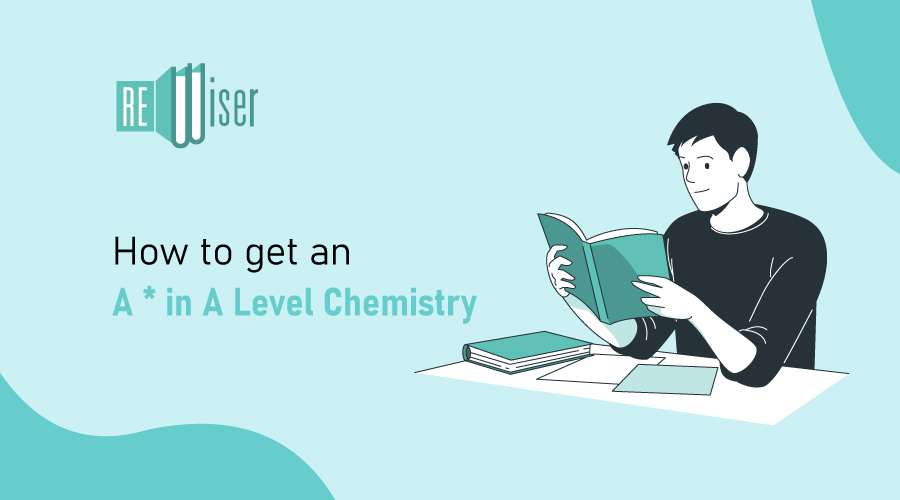
How to get an A * in A Level Chemistry?
Achieve an A* in A-level Chemistry by understanding the core concepts rather than rote memorization. Regularly practice problem-solving using past papers, highlighting and addressing weak areas. Use several resources like textbooks, online videos, and revision guides to grasp challenging topics. Stay consistent in your studies, breaking down the syllabus into manageable sections and revising systematically. Participate actively in practical labs, ensuring you understand the real-world applications of theoretical knowledge. Finally, maintain a steady study routine, seek help when needed, and prioritize self-care, ensuring a balanced state of mind before the A-Level Chemistry exam.
Table of Contents:
- Use your A-Level Chemistry Specification
- Don’t rewrite the A-level Chemistry textbooks
- Identify your weaknesses in a level chemistry revision
- Don’t neglect your math or practical skills
- Keep practising
- Use the A-level Chemistry Syllabus Examiners report
- Start early
Use your A-Level Chemistry Specification –
Your specification is a detailed level chemistry syllabus provided by the exam board. It outlines exactly what you need to know, topic by topic. By following it closely, you ensure that you cover all necessary material and don’t waste time on content that isn’t assessed.
It is very helpful because if it’s not on the specification, it means you don’t need to know it. If it is on the specification, you do need to know it, so make sure you don’t avoid it during your revision. This allows you to track the topics you have already covered.
Don’t rewrite the A-level Chemistry textbooks –
While taking notes is helpful, merely rewriting your textbook is time-consuming and not very effective. Instead, condense information into concise, personalized needs that highlight key concepts, formulas, and reactions. It makes revision more efficient.
It can often end up being a waste of time. When writing notes, try to use your own words and condense the textbook. Try to use a method that involves active recall. This is a better technique than just reading the textbook because you’re forcing your brain to remember what you’ve read actively.
Identify your weaknesses in a level chemistry revision –
Everyone has areas they find more challenging. It’s important to recognize where you struggle and focus extra efforts. Regularly test yourself to identify these weak points. Once recognized, you can take targeted actions like seeking additional resources or asking for help on these topics.
Don’t let this put you off. Once you identify your weakness, try to use different methods to tackle it. You can also look at videos on YouTube. To get an A*, you want to be getting as many marks as possible, so you need to be comfortable with all topics.
Don’t neglect your math or practical skills –
A-level chemistry isn’t just about theory. Mathematical problem-solving and practical laboratory skills are integral to the course. Ensure you’re comfortable with calculation and laboratory techniques, as these will undoubtedly appear in both coursework and a-level chemistry exam.
This will save you time during the exam. You don’t need to be studying A-level Maths to handle the A-level Chemistry, so don’t feel tensed if you aren’t. You can take notes of how you set up the equipment, what chemicals you use and in which order.
Keep practising –
Regular practice, especially using past papers, helps familiarize you with the exam format and improves your problem-solving speed. Over time, you’ll recognize patterns in questions and become more adept at answering them efficiently.
Suppose you want to familiarize yourself with the topics that often come up to ensure that you are comfortable with them. Be strict when you’re marking your answers, and really understand where you went wrong.
Use the A-level Chemistry Syllabus Examiners report –
After each exam series, examiners release a report detailing common mistakes students made and areas where they performed well. The report is invaluable! It offers insights directly from those who grade your papers, helping you understand what they look for and how to avoid common pitfalls.
There are often explanations beside each question, so it can be more helpful than the marking scheme, which gives you the answer. One can use this to see what common mistakes are often made and how you can avoid them.
Also Read – How to choose the Right A Level Subjects?
Start early –
Procrastination is the enemy of success. Begin your revision and preparation well in advance of exams. An early start gives you ample time to cover all content, practice extensively and address any challenges you face, reducing last-minute stress.
Ensure you allocate time to cover all the topics in the specification with a timetable. Make sure you start early enough that you have time to utilize practice papers for A-level. Try to stay organized throughout the year with your revision materials so that when it comes closer to exams, you have everything ready to start your revision.
If you need additional support for your A-level Syllabus, then you can contact Team ReWiser: Contact Us – ReWiser
Conclusion –
Securing an A* in A-level chemistry is an achievable endeavour rooted in methodical preparation, keen understanding, and consistent practice. By adhering closely to the specification, concentrating on both theoretical and practical aspects, and leveraging resources. Do remember it’s not merely about the volume of hours it takes for studying but the quality and strategic approach of those hours.

